语法学习--虚拟语气(Unit7)
(完整版)高中英语语法(人教版)
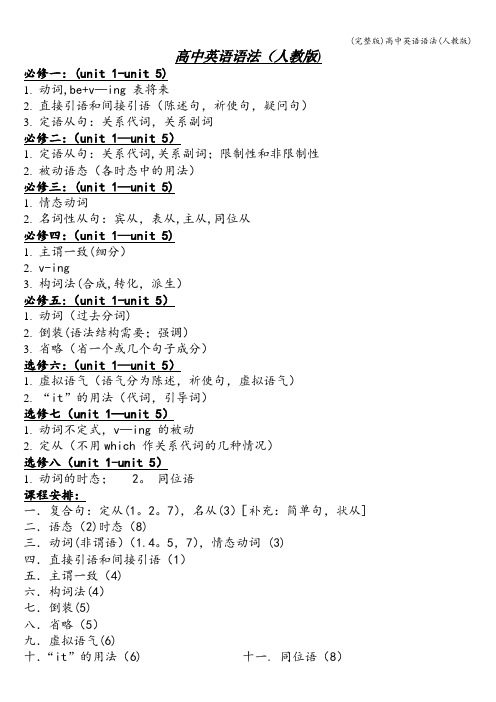
(完整版)高中英语语法(人教版)
高中英语语法(人教版)
必修一:(unit 1-unit 5)
1.动词,be+v—ing 表将来
2.直接引语和间接引语(陈述句,祈使句,疑问句)
3.定语从句:关系代词,关系副词
必修二:(unit 1—unit 5)
1.定语从句:关系代词,关系副词;限制性和非限制性
2.被动语态(各时态中的用法)
必修三:(unit 1—unit 5)
1.情态动词
2.名词性从句:宾从,表从,主从,同位从
必修四:(unit 1—unit 5)
1.主谓一致(细分)
2.v-ing
3.构词法(合成,转化,派生)
必修五:(unit 1-unit 5)
1.动词(过去分词)
2.倒装(语法结构需要;强调)
3.省略(省一个或几个句子成分)
选修六:(unit 1—unit 5)
1.虚拟语气(语气分为陈述,祈使句,虚拟语气)
2.“it”的用法(代词,引导词)
选修七(unit 1—unit 5)
1.动词不定式,v—ing 的被动
2.定从(不用which 作关系代词的几种情况)
选修八(unit 1-unit 5)
1.动词的时态; 2。
同位语
课程安排:
一.复合句:定从(1。
2。
7),名从(3)[补充:简单句,状从]
二.语态(2)时态(8)
三.动词(非谓语)(1.4。
5,7),情态动词 (3)
四.直接引语和间接引语(1)
五.主谓一致(4)
六.构词法(4)
七.倒装(5)
八.省略(5)
九.虚拟语气(6)
十.“it”的用法(6) 十一. 同位语(8)。
高中英语Unit7CareersPeriod4Lesson3课件北师大版选择性必修第三册
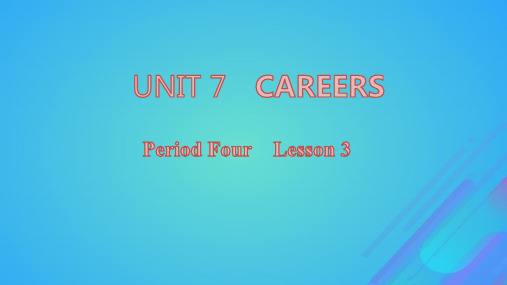
( )3.If you want to become an expert or a specialist in
something one day, you will need to be the followings EXCEPT
________.
A.a risk taker
B.an innovator
4.essential adj. 极其重要的;最基本的→________ adv. 本质上;根本上;大体上;基本上
(参考:fortunate→fortunately) 5.special adj. 特别的→________ n. 专家 (参考:social→socialist) 【答案】4.essentially 5.specialist
I have been so occupied with work that I haven’t had time for social activities.
工作太忙,我一直没时间参加社交活动。 occupy oneself with sth. /in doing sth. 忙于做某事
【针对练习】 单句语法填空 (1)I have been ________(occupy) in reading history books. (2)I suppose I was looking for an ________(occupy) which was going to be an adventure. 【答案】(1)occupied (2)occupation
( )5.Today, jobs come and go at an amazing speed, so you can’t be replaced by something or somebody.
九年级英语unit7where-would-you-like-to-visit单元知识点
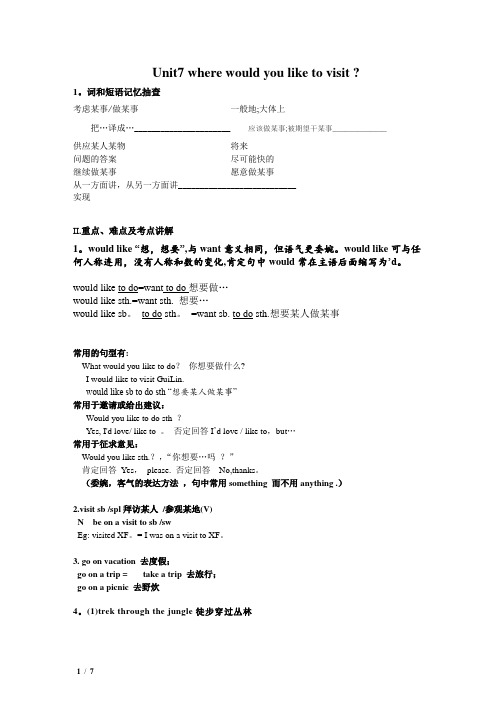
Unit7 where would you like to visit ?1。
词和短语记忆抽查考虑某事/做某事________________ 一般地;大体上__________________ 把…译成…______________________ 应该做某事;被期望干某事_____________供应某人某物____________________ 将来_____________________________问题的答案______________________ 尽可能快的_______________________继续做某事______________________ 愿意做某事_______________________从一方面讲,从另一方面讲___________________________实现____________________________II.重点、难点及考点讲解1。
would like “想,想要”,与want意义相同,但语气更委婉。
would like可与任何人称连用,没有人称和数的变化,肯定句中would常在主语后面缩写为’d。
would like to do=want to do想要做…would like sth.=want sth. 想要…would like sb。
to do sth。
=want sb. to do sth.想要某人做某事常用的句型有:What would you like to do?你想要做什么?I would like to visit GuiLin.would like sb to do sth “想要某人做某事”常用于邀请或给出建议:Would you like to do sth ?Yes, I'd love/ like to 。
否定回答I’d love / like to,but…常用于征求意见:Would you like sth.?,“你想要…吗?”肯定回答Yes,please. 否定回答No,thanks。
人教版九年级英语重点知识梳理词汇_短语句型语法

九年级英语知识点Unit 1I、重点短语:1.lisen to tapes 听录音2. ask the teacher for help 向老师请求帮助3. read aloud 朗读4. speaking skills 口头表达能力5.spoken English英语口语6. end up 结束ter on 以后,随后8. make mistakes 犯错,出错ugh at嘲笑,取笑10.take notes 做笔记,做记录11.look …up (在词典、参考书等中)查阅,查找12. make up 编造,组成13.deal / do with 处理,应付14.be angry with生……的气15.go by (指时间)过去,消逝16.try one’s best to do sth. 尽力做……17.break off 突然中止,中断18. with the help of 在……的帮助下19.regard…as…把……当做……20.be afraid of doing / to do sth 害怕做某事21. first of all 首先,开始22. have trouble / a difficult / hard time doing sth.做某事有困难II、重点句型:1.It’s too hard to understand the voices. 理解那些话有困难。
(It’s too ...to ....)2. How do you study for a test? I study by listening to tapes.我通过听磁带学习。
(by )3. Studying grammar is a great way to learn a language.(动名词做主语谓语用单数)4.I was afraid to speak in class. 我害怕在课堂上说话。
苏教牛津译林高中英语模块6_Unit4 _语法专讲:虚拟语气
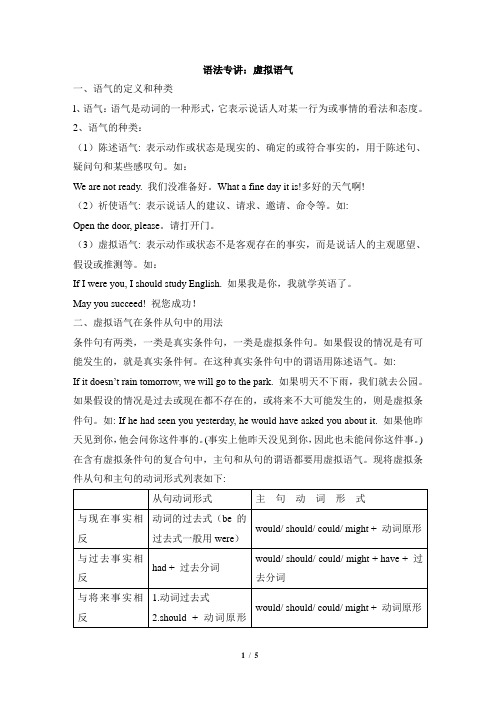
语法专讲:虚拟语气一、语气的定义和种类l、语气:语气是动词的一种形式,它表示说话人对某一行为或事情的看法和态度。
2、语气的种类:(1)陈述语气: 表示动作或状态是现实的、确定的或符合事实的,用于陈述句、疑问句和某些感叹句。
如:We are not ready. 我们没准备好。
What a fine day it is!多好的天气啊!(2)祈使语气: 表示说话人的建议、请求、邀请、命令等。
如:Open the door, please。
请打开门。
(3)虚拟语气: 表示动作或状态不是客观存在的事实,而是说话人的主观愿望、假设或推测等。
如:If I were you, I should study English. 如果我是你,我就学英语了。
May you succeed! 祝您成功!二、虚拟语气在条件从句中的用法条件句有两类,一类是真实条件句,一类是虚拟条件句。
如果假设的情况是有可能发生的,就是真实条件何。
在这种真实条件句中的谓语用陈述语气。
如:If it doesn’t rain tomorrow, we will go to the park. 如果明天不下雨,我们就去公园。
如果假设的情况是过去或现在都不存在的,或将来不大可能发生的,则是虚拟条件句。
如: If he had seen you yesterday, he would have asked you about it. 如果他昨天见到你,他会问你这件事的。
(事实上他昨天没见到你,因此也未能问你这件事。
) 在含有虚拟条件句的复合句中,主句和从句的谓语都要用虚拟语气。
现将虚拟条件从句和主句的动词形式列表如下:注: 主句中的should只用于I、we,但在美国英语中,should常被would代替;从句中的should 可用于各种人称。
l、表示与现在事实相反的假设和结果。
如:If my brother were here, everything would be all right.要是我哥哥在这儿,一切都没问题了。
仁爱版七年级英语下册Unit7TheBirthdayParty词汇精讲精练含答案
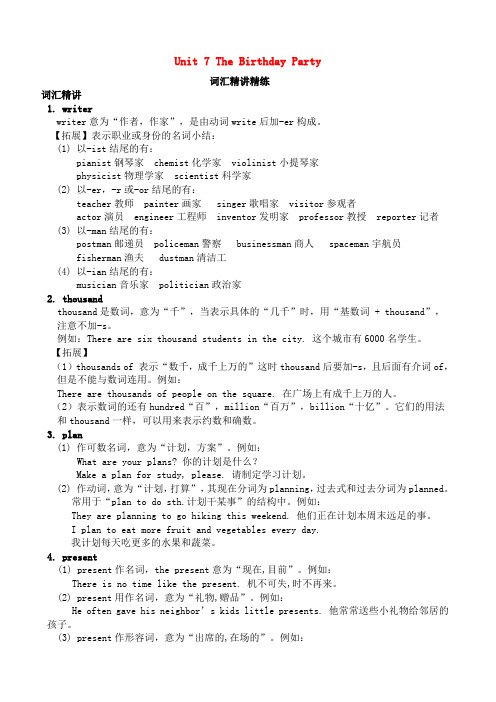
Unit 7 The Birthday Party词汇精讲精练词汇精讲1. writerwriter意为“作者,作家”,是由动词write后加-er构成。
【拓展】表示职业或身份的名词小结:(1) 以-ist结尾的有:pianist钢琴家 chemist化学家 violinist小提琴家physicist物理学家 scientist科学家(2) 以-er,-r或-or结尾的有:teacher教师 painter画家 singer歌唱家 visitor参观者actor演员 engineer工程师 inventor发明家 professor教授 reporter记者(3) 以-man结尾的有:postman邮递员 policeman警察 businessman商人 spaceman宇航员fisherman渔夫 dustman清洁工(4) 以-ian结尾的有:musician音乐家 politician政治家2. thousandthousand是数词,意为“千”,当表示具体的“几千”时,用“基数词+ thousand”,注意不加-s。
例如:There are six thousand students in the city. 这个城市有6000名学生。
【拓展】(1)thousands of 表示“数千,成千上万的”这时thousand后要加-s,且后面有介词of,但是不能与数词连用。
例如:There are thousands of people on the square. 在广场上有成千上万的人。
(2)表示数词的还有hundred“百”,million“百万”,billion“十亿”。
它们的用法和thousand一样,可以用来表示约数和确数。
3. plan(1) 作可数名词,意为“计划,方案”。
例如:What are your plans? 你的计划是什么?Make a plan for study, please. 请制定学习计划。
新目标八年级英语上册unit7-uni12知识点总结

Unit 7 How do you make a banana milk shake?第1课时1、turn on 打开turn off 关闭turn up 开大点turn down 关小点2、cut v.切,割cut- cutting cut,cut up切碎cut down 砍倒cut off砍开cut sth into slices 把…剁碎3、peel v.刨,削,peel apples 削苹果4、pour v.泼,倒pour—pouring poured,pour…into…把…倒进…里eg: pour milk into the blender 把牛奶倒进搅拌器中。
pour …out of …,把…倒出…,pour out 倾诉,pour sb sth=pour sth for sb 给…倒…5、yogurt un.酸奶e g: a cup of yogurt 一杯酸奶6、ingredient cn.材料many kinds of ingredients 各种材料7、cup cn. 杯,a cup of tea ,一杯茶two cups of coffee 两杯咖啡8、watermelon cn.西瓜,many watermelons 许多西瓜9、teaspoon cn. 茶匙a teaspoons of honey 一茶匙蜂蜜three teaspoons of yogurt 三茶匙酸奶10、amount n.数量,a large amount of money一大笔钱11、instruction cn.命令,指示,用法说明,an instrction for the medicine ,药品的说明,some sug gestions for …,……的解决办法,a ticket for the concert,一张音乐会的票,the recipe for the food ,食物的做法,the answer to the question 问题的答案,the key to the door 门的钥匙,the solution for the problem 问题的解决办法。
虚拟语气(经典课件)
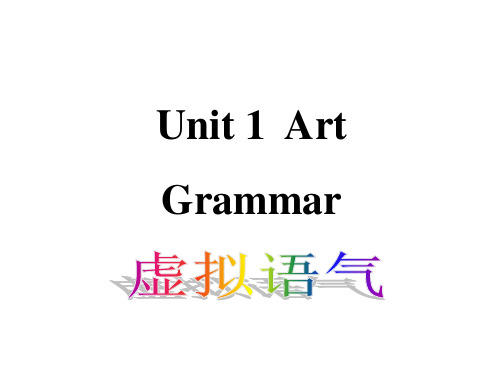
not sleep He ordered that we ____________.
4)他要求我们按时读完这本书。
should finish He demanded that we __________ the book on time.
8、虚拟语气在主语从句的使用
It is suggested / ordered / insisted / demanded / requested ·· that + S + (should) + V ·· ··
13. would rather that
did / were had done
I would rather you _____ me now. paid I would rather you ________ here than __________. went away remained I would rather you ____________ that. hadn’t done I would rather you __________ there too. had gone
6、表示愿望, 期待的虚拟语气 S + wish S did / were (that) If only S had done
1) 我要是记得他的地址就好了.
与现在相反 与过去相反
I wish that I remembered his address. If only I remembered his address.
1、当suggest译成“建议”, insist译成“坚持…做……”时, 从句用(should)
do… insist译成“坚持认为”时,从
- 1、下载文档前请自行甄别文档内容的完整性,平台不提供额外的编辑、内容补充、找答案等附加服务。
- 2、"仅部分预览"的文档,不可在线预览部分如存在完整性等问题,可反馈申请退款(可完整预览的文档不适用该条件!)。
- 3、如文档侵犯您的权益,请联系客服反馈,我们会尽快为您处理(人工客服工作时间:9:00-18:30)。
虚拟语气
语气,时态和语态都是动词的语法范畴。
语气分为三种:陈述语气,祈使语气和虚拟语气。
陈述语气用来陈述事实和对事实提出疑问。
祈使语气用来表示命令和请求。
虚拟语气用来表示说话人的一种主观愿望和假设的情况,而并非事实或难以成为事实,用于简单句,条件句以及其他的一些从句中。
Ⅰ. 虚拟语气在条件句中的运用
英语中的条件句一般有两种,真实条件句和非真实条件句。
虚拟语气用在非真实条件句。
非真实条件句包括虚拟条件句,推测条件句和错综时间条件句等。
1.虚拟条件句
虚拟条件句可以分为两类,一类是叙述与现实事实相反的情况,一类是叙述与过去事实相反的情况,其构成形式是:
条件从句结果主句
与现在事实相反If I(we, you, he, she,
it, they)+动词的过去
式(be动词的过去式
一律用were)
I(we, you, he, she, it,
they)+would+动词原
形
与过去事实相反 If I(we, you, he, she,
it, they) had+ 过去分
词
I(we, you, he, she, it,
they)+ would+
have+过去分词
注意;would 省略时也可以按句意换用should, could或might.
The flood might have caused great damages to the people if we hadn’t built so many reservoirs.
The conference wouldn’t have been so successful if we hadn’t made adequate preparations.
I am sorry I am very busy just now. If I had time, I would certainly go to the movies with you
2.推测条件句
对未来的事进行推测,在讲话人的心目中,虽然不认为推测条件的实现违背事实或绝对不可能,但却认为可能性极小。
这种怀疑和推测要用虚拟语气表示,其构成形式如下:
条件从句结果主句
If I(we, you, he, she, it, they)+动词过去式(be 动词的过去式一律用
were)
If I(we, you, he, she, it, they)+should+动词原形If I(we, you, he, she, it, they)+were to +动词原形I(we, you, he, she, it, they)+would+动词原形
If I were to see him, I would speak to him about it.
I would not believe it, unless I should see it
3.错综时间条件句
在错综时间条件句中,虚拟显见从句和主句的动作发生的时间不一致,因此,主句和从句的谓语动词要根据各自所指的不同时间选用适当的虚拟语气形式。
例如:
Had I taken my umbrella with me when I came out this morning, I should not be wet now.
如果我早上出门是带了伞,现在我就不会淋湿了
If you had spoken to him last time you saw him, you would know what to do now.
如果你赏赐看到他是跟他说一下,现在就知道该怎么做了。
4.虚拟条件句的简化
有些虚拟条件句可以不用从句表现出来,而是用介词,介词短语,动词不定式短语或利用上下文等形式表现出来,比如:with, without, but for , suppose, supposing, or, otherwise, but. Though, even, in the event that. 例如:
But for your help we couldn’t have succeeded.
要不是有你的帮助,我们是不会成功的。
They wouldn’t have reached the agreement so easily without that common ground.
没有共同的立场,他们是不会那么容易达成协议的。
She wasn’t feeling very well. Otherwise she wouldn’t have left the meeting so early.
她感到不舒服,不然她是不会那么早走的
Ⅱ。
虚拟语气在某些从句中的运用
1.动词wish后的宾语从句用虚拟语气
与现实事实相反,用were或动词的一般过去式,与过去事实相
反,用had+过去分词或would/could + have+过去分词;表示将来没有把握或不太可能的愿望,would/could(should, might)+动词原形。
例如:
I wish she were here.
I wish she would go with me tomorrow.
I wish she had taken my advice.
2.would rather(sooner), had rather, would as soon和just as soon后的句子用虚拟语气。
I’d rather you paid the money yourself.
I would sooner she painted the wall green next time.
3.if only后用虚拟语气。
If only she had known where to find you. 要是她知道去那里找你就好了。
If only I could speak several languages !我要是能将几门外语就好了。
4.虚拟语气用在suggest, order, demand, propose, command, request, desire, insist, require, decide, promise, arrange, ask, move, consent, determine, recommend, advise, intend, beg, resolve, argue等动词后的宾语从句中,这时,谓语动词要用动词原形或should+动词原形
She insisted that the seats (should)be booked in advance.
He advised that the doctor (should) be sent for.
5.虚拟语气用在advice, demand, order,decision, proposal, necessity, requirement, suggestion,等名词后的从句中, 这是谓语动词用原形或should+动词原形
The demand is that the job (should) be finished today.
6.形容词important, necessary, probable, possible, preferable. Advisable等,可以构成‘it is +形容词+that’, 其后的句子要用虚拟语气。
这时,谓语动词用原形或should+动词原形。
It is necessary that something (should) be done to deal with it.
7.It is (high, about) time……句型要求用虚拟语气, 这时,位于动词用过去式或should+动词原形(should不能省略)例如;It is high time that we were off.。
